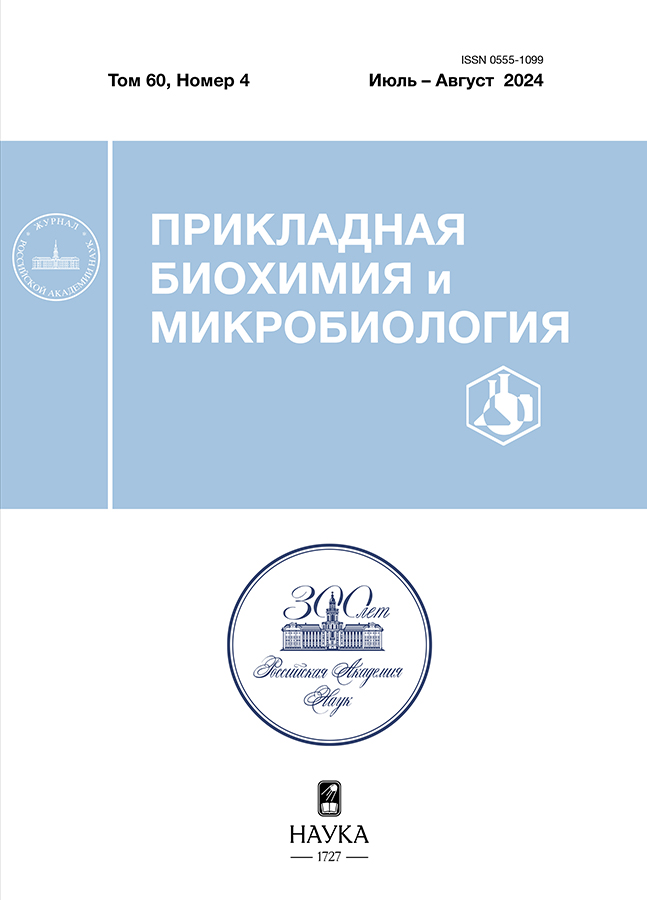Platinum nanoparticles in aqueous solutions of chitosan-vinylpyrrolidone copolymer: synthesis and biological activity
- Autores: Zuev D.N.1, Cherkasova E.I.1, Apryatina K.V.1, Zaitsev S.D.1, Smirnova L.A.1
-
Afiliações:
- National Research Nizhny Novgorod State University named after N.I. Lobachevsky
- Edição: Volume 60, Nº 4 (2024)
- Páginas: 356-365
- Seção: Articles
- URL: https://cardiosomatics.ru/0555-1099/article/view/674540
- DOI: https://doi.org/10.31857/S0555109924040049
- EDN: https://elibrary.ru/SBIMRS
- ID: 674540
Citar
Texto integral
Resumo
Grafted copolymers of chitosan-vinylpyrrolidone, water-soluble at a pH of 6.8–7.5, were obtained. A technique has been developed for obtaining an aggregatively stable system of platinum nanoparticles in copolymer solutions with an average size of ~ 4 nm. The thermophysical and structural characteristics of the powdered composition of a platinum nanoparticle-copolymer are investigated. An in vitro comparison of the antitumor activity of solutions of the developed composition and cisplatin at the same platinum concentration was performed. It was found that with respect to the culture of HeLa Kyoto and A431 cancer cells, the composition is five and two times less effective than cisplatin, respectively. Along with this, the biocompatibility of the composition is 17 times higher than that of cisplatin, which allows its use at elevated concentrations and the development of an antitumor agent with platinum nanoparticles commensurate in effectiveness with cisplatin.
Texto integral
Sobre autores
D. Zuev
National Research Nizhny Novgorod State University named after N.I. Lobachevsky
Autor responsável pela correspondência
Email: z_u_e_v2020@mail.ru
Rússia, Nizhny Novgorod, 603022
E. Cherkasova
National Research Nizhny Novgorod State University named after N.I. Lobachevsky
Email: z_u_e_v2020@mail.ru
Rússia, Nizhny Novgorod, 603022
K. Apryatina
National Research Nizhny Novgorod State University named after N.I. Lobachevsky
Email: z_u_e_v2020@mail.ru
Rússia, Nizhny Novgorod, 603022
S. Zaitsev
National Research Nizhny Novgorod State University named after N.I. Lobachevsky
Email: z_u_e_v2020@mail.ru
Rússia, Nizhny Novgorod, 603022
L. Smirnova
National Research Nizhny Novgorod State University named after N.I. Lobachevsky
Email: z_u_e_v2020@mail.ru
Rússia, Nizhny Novgorod, 603022
Bibliografia
- Yamada M., Foote M., Prow T.W. // WIREs Nanomed. Nanobiotechnol. 2015. V. 7. P. 428–445. https://doi.org/10.1002/wnan.1322
- Rai M., Ingle A.P., Birla S., Yadav A., Santos C.A.D. // Crit. Rev. Microbiol. 2016. V. 42. P. 696–719. https://doi.org/10.3109/1040841X.2015.1018131
- Arvizo R.R., Bhattacharyya S., Kudgus R.A., Giri K., Bhattacharya R., Mukherjee P. // Chem. Soc. Rev. 2012. V. 41. P. 2943–2970. https://doi.org/10.1039/c2cs15355f
- Huang H., Yuan Q., Yang X. // Colloids Surf. B. 2004. V. 39. P. 31–37. https://doi.org/10.1016/j.colsurfb.2004.08.014
- Du Y.K., Yang P., Mou Z.G., Hua N.P., Jiang L. // J. Appl. Polym. Sci. 2006. V. 99. P. 23–26. https://doi.org/10.1002/app.21886
- Rai M., Ingle A.P., Gupta I., Brandelli A. // Int. J. Pharm. 2015. V. 496. P. 159–172. https://doi.org/10.1016/j.ijpharm.2015.10.059
- Yerpude S.T. et al. // Environmental Research. 2023. V. 231 (2). 116148. https://doi.org/10.1016/j.envres.2023.116148
- Khan M.A.R., Al Mamun M.S., Ara M.H. // Microchemical Journal. 2021. V. 171. С. 106840. https://doi.org/10.1016/j.microc.2021.106840
- Gutiérrez de la Rosa S.Y. et al. // International Journal of Molecular Sciences. 2022. V. 23. № . 16. С. 9404. https://doi.org/10.3390/ijms23169404
- Malode U. et al. // Bulletin of the National Research Centre. 2023. V. 47. № . 1. C. 130. https://doi.org/10.1186/s42269-023-01104-y
- Kumar A., Das N., Rayavarapu R.G. // Journal of Nanotheranostics. 2023. V. 4. № . 3. С. 384–407. https://doi.org/10.3390/jnt4030017
- Jan H. et al. // Journal of Saudi Chemical Society. 2021. Т. 25. № . 8. С. 101297. https://doi.org/10.1016/j.jscs.2021.101297
- Jeyaraj M., Gurunathan S., Qasim M., Kang M., Kim J. // Nanomaterials. 2019. V. 9. № 12. P. 1719. https://doi.org/10.3390/nano9121719
- Wang W., Liang G., Zhang W. // Chem Mater. 2018. V. 30. № 10. P. 3486–3498. https://doi.org/10.1038/s41467-019-09566-3
- Kutwin M. // Arch. Med. Sci. 2017. V. 201. № 13. P. 1322–1334. https://doi.org/10.5114/aoms.2016.58925
- Аранцева Д.А., Водовозова Е.Л. // Биоорганическая химия. 2018. Т. 44. № 6. С. 620–6З2. https://doi.org/10.19163/2307-9266-2021-9-4-252-265
- Моисеенко В.М. // Практическая онкология. 2006. Т. 7. № 3. C. 170–178.
- Вартанян А.А., Огородникова М.В. // Российский биотерапевтический журнал. 2004. Т. 1. № 3. С. 14–18.
- Ахтямов А.Э. // Международный студенческий научный вестник. 2018. № 4 (часть З). С. 4З6–4З9.
- Johnstone T.C., Suntharalingam K., Lippard S.J. // Prodrugs. Chem. Rev. 2016. V. 116. № 5. P. 3436–3486. https://doi.org/10.1021/acs.chemrev.5b00597
- Panikkanvalappil S.R., Mahmoud M.A., Mackey M.A., El-Sayed M.A. // ACS Nano. 2013, V. 7. № 9. P. 7524–7533. https://doi.org/10.1021/nn403722x
- Zhang C., Xu C., Gao X., Yao Q. // Theranostics. 2022. V. 12. № 25. P. 2115–2132. https://doi.org/10.7150/thno.69424
- Wennemers H., Shoshan M.S., Vonderach T. // Angewandte Chemie International Edition. 2018. V. 58. № 15. P. 4901–4905. https://doi.org/10.1002/anie.201813149
- Варламов В.П., Ильина А.В., Шагдарова Б.Ц., Луньков А.П., Мысякина И.С. // Успехи биологической химии. Т. 60. 2020. С. 317–368.
- Свирщевская Е.В., Гриневич Р.С., Решетов П.Д., Зубов В.П., Зубарева А.А., Ильина А.В., Варламов В.П. // Бионанотехнологии и нанобиоматериаловедение. 2012. Т. 1. № 19. С. 13–19.
- Sartaj A., Qamar Z., Qizilbash F.F., Annu K., Md S., Alhakamy N., Baboota S., Ali J. // Polymers (Basel). 2021. V. 13. № 24. P. 4400. https://doi.org/10.3390/polym13244400
- Панфилова Е.В., Буров А.М., Хлебцов Б.Н. // Коллоидный журнал. 2020. Т. 82. № 1. С. 37–46. https://doi.org/10.31857/S0023291220010097
- Nie Z., Petukhova A., Kumacheva E. // Nat. Nanotechnol. 2010. V. 5. № 1. P. 15–25. https://doi.org/10.138/nnano.2009.453
- Куликов С.Н., Хайруллин Р.З. // Вестник Казанского технологического университета. 2015. Т. 18. № 18. С. 265–267.
- Литманович О.Е. // Высокомолекулярные соединения, Серия C. 2008. Т. 50. № 7. С. 1370–1396.
- Pourjavadi A., Mahdavinia G.R., Zohuriaan-Mehr M.J., Omidian H. // Journal of Applied Polymer Science. 2003. V. 88. № 8. P. 2048–2054. https://doi.org/10.1002/app.11820
- Solomko N.Yu., Dron I.A., Budishevskaya O.G., Voronov S.A. // Procedia Chemistry. 2009. V. 1. № . 2. P. 1567–1575. https://doi.org/10.1016/j.proche.2009.11.005
- Hsu S.-C., Don T.-M., Chiu W.-Y. // J. Appl. Polym. Sci. 2002. V. 86. № 12. P. 3047–3056. https://doi.org/10.1002/app.11333
- Аржаков М.C. Термомеханика полимеров. Montreal: Accent Graphics Communications, 2019. 150 с.
Arquivos suplementares





















